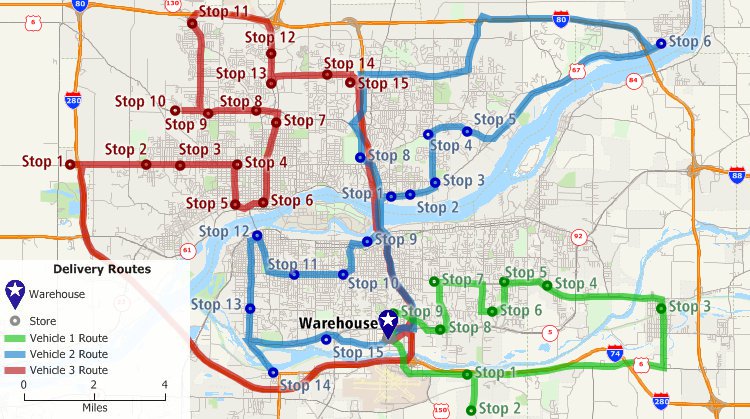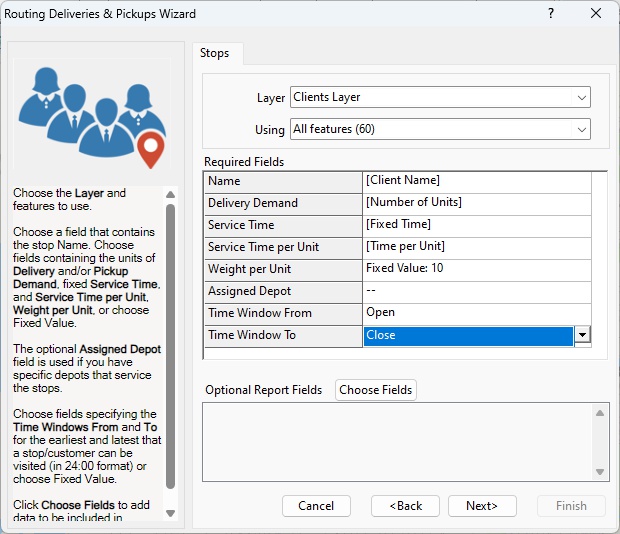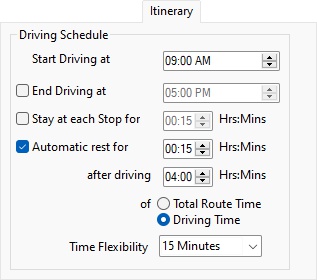

Author:
Stewart Berry
Images: Dan Martin
18 April 2024

As a business or delivery company, optimizing your delivery routes is crucial for efficiency, cost-savings, and customer satisfaction. While free online directions tools may seem like a quick solution, they often fall short when it comes to the complexities of business routing problems. In this article, we'll explore nine tips to help you improve your delivery routes using a more sophisticated logistics solution like Maptitude.
Free tools may allow you to optimize a single list of addresses, but you'll likely have to manually type in the locations. A mapping software or geographic information system (GIS) like Maptitude can automatically map lists of locations from a spreadsheet and handle multiple routes, making the process much more efficient.

One of the key advantages of using a GIS-based solution is the ability to visualize your delivery routes on a map. This can provide valuable insights into the geographic distribution of your customers, identify potential bottlenecks or congestion areas, and help you make more informed decisions about route planning.
Additionally, GIS software often integrates with other data sources, such as customer databases and vehicle tables. This helps you quickly manage your fleets and to make adjustments to your routes accordingly, ensuring your drivers are taking the most efficient paths.

|
“Using Maptitude to work out the closest members of staff to each store we visit has been incredibly helpful in reducing the travel done by our merchandisers, leading to positive environmental and financial results.”
|
When you require more sophisticated options, such as managing multiple vehicle fleets, varying start and end times for different drivers, scheduled delivery times, and varying product volumes, a simple "directions" application won't cut it. A logistics solution like Maptitude can model trips individually or optimize across your entire vehicle fleet to ensure the most efficient allocation of resources.

This type of optimization can help you reduce the number of vehicles needed, minimize overall mileage, and ensure that each driver's route is as efficient as possible. By considering factors like vehicle capacity, delivery time windows, and driver availability, you can create a more streamlined and cost-effective delivery operation.
Read How to Optimize for Multiple Vehicles and Stops
Preventing overnight stops where an unfinished route is assumed to resume the next day is important. Look at what could reasonably be the last stop of the day and choose the amount of time you're willing to allow drivers to continue each day.

This can help you avoid situations where drivers are forced to stop in the middle of a route, potentially leading to delays or additional costs. By setting realistic cutoff times and ensuring that routes can be completed within a single day, you can improve the overall efficiency and reliability of your delivery operations.
Watch How to Modify Delivery Schedules and Stop Duration
Itineraries need to make reasonable assumptions about the average time a delivery driver spends at each stop. Avoid applications that allow no time for stop duration, as they assume you're just driving past each location. Knowing the amount of time to spend at each location is valuable in determining accurate routes.

This is particularly important for businesses with a diverse range of delivery types or customer needs. For example, a large retail order may require more time to unload and process than a small residential delivery. By accounting for these differences, you can create more realistic and efficient routes that better reflect the actual time required at each stop.
Watch How to Account for Time Spent at Each Stop
Accurately specifying the length and frequency of driver rest breaks and choosing whether the frequency is based on total route time or just driving time, are critical factors to consider when scheduling routes.

Ensuring that your drivers have adequate rest time is not only important for their well-being and safety, but it can also help prevent fatigue-related errors or delays. By incorporating rest breaks into your route planning, you can help maintain the productivity and reliability of your delivery operations.
Choosing whether to calculate driving costs based on fuel (price and consumption) or a flat rate per mile is another way to optimize your routes. Often, it's important to minimize actual monetary costs per route, in addition to determining the most efficient directions.

This can be particularly important for businesses with a large fleet of vehicles or those operating in areas with fluctuating fuel prices. By accurately accounting for these costs, you can make more informed decisions about route planning and vehicle utilization, ultimately improving your bottom line.
Your logistics solution should be able to handle both pickups and deliveries, ensuring that your routes are optimized for the full scope of your operations.

Many businesses, such as those in the manufacturing or retail sectors, may require a combination of pickups and deliveries as part of their supply chain. By using a routing solution that can accommodate both, you can create more efficient and comprehensive routes that maximize the utilization of your vehicles and resources.
Read How to Accommodate Pickups and Deliveries
If your business requires long-haul routes that can extend overnight, your routing software should be able to accommodate these scenarios, including driver rest requirements.

Longer-distance routes can introduce additional complexities, such as the need for driver rest periods, refueling stops, and potential delays due to weather or traffic conditions. By using a logistics solution that can account for these factors, you can ensure that your long-haul routes are planned and executed efficiently, minimizing the risk of delays or additional costs.
Read How to Plan for Long-Haul Routes and Overnight Trips
Consider the flexibility you have in meeting scheduled arrival and departure times and ensure your routing software can take this into account when optimizing your routes.

In some cases, your customers may have strict delivery windows or time requirements, while in others, you may have more flexibility regarding when deliveries can be made. By communicating these scheduling needs to your routing software and incorporating them into the optimization process, you can create routes that better align with your customers' expectations and your own operational constraints.
By implementing these nine tips and leveraging a sophisticated logistics solution like Maptitude, you can significantly improve the efficiency and cost-effectiveness of your delivery routes, ultimately enhancing your overall business operations and customer satisfaction.
Optimizing your delivery routes is a complex and multifaceted challenge, but the right tools and strategies can make a significant difference. By using mapping software and GIS, accounting for multiple vehicles and stops, managing delivery schedules and stop durations, building in rest time, and considering a range of other factors, you can create a more streamlined and efficient delivery operation.
Remember, the key to successful route optimization is to think beyond simple "directions" and instead focus on the unique needs and constraints of your business. By taking a comprehensive and strategic approach, you can unlock new levels of efficiency, cost savings, and customer satisfaction – all of which can contribute to the long-term success of your delivery operations.
Learn more about Maptitude to see how you and your team can benefit from mapping software!
Schedule a Free Personalized Demo

 Check out our G2 Reviews
Check out our G2 Reviews
Home | Products | Contact | Secure Store